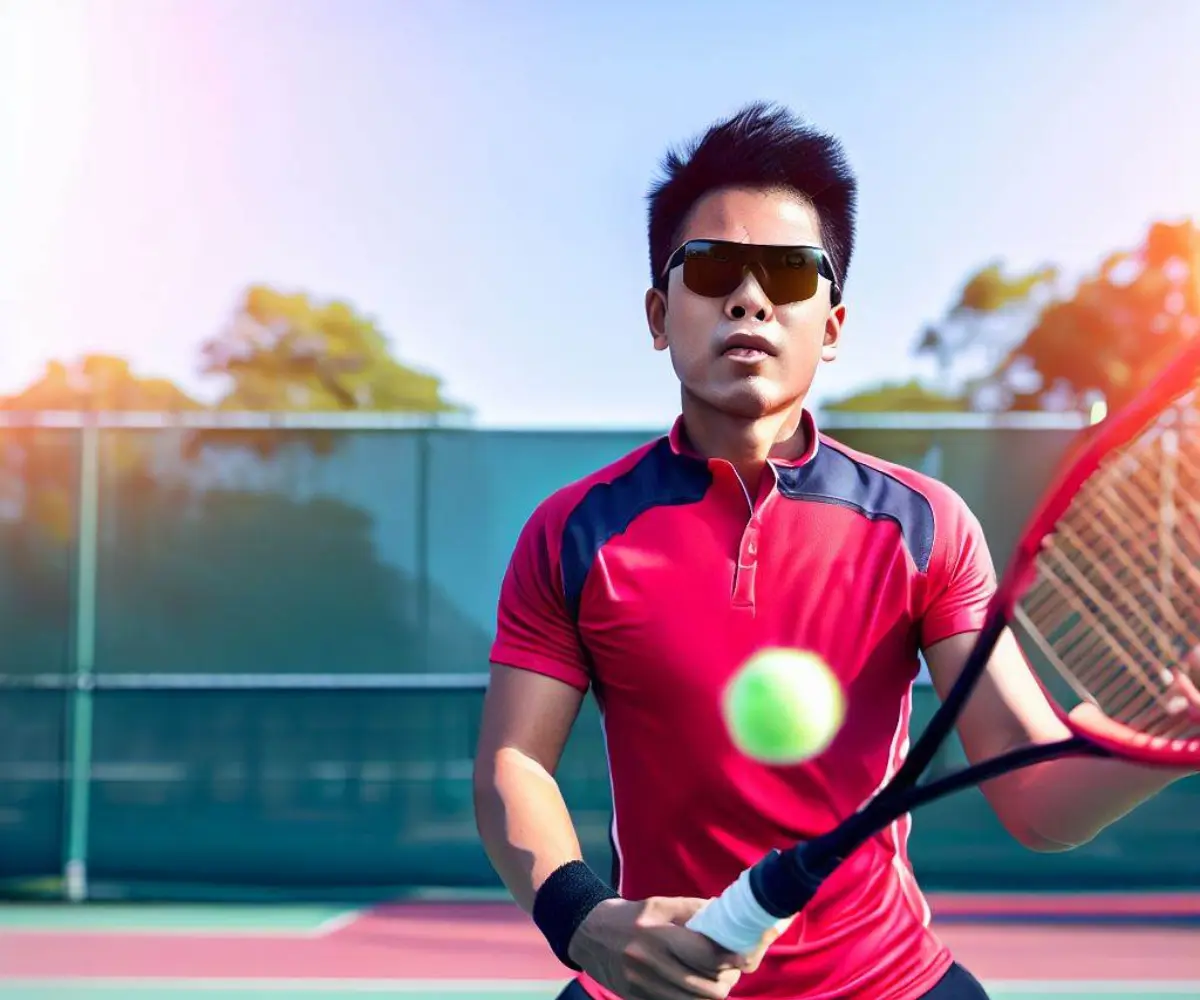Hey, fellow tennis enthusiasts! Ever wondered if sporting those snazzy shades while battling it out on the court is a do or a don’t? Well, guess what – we’ve got the scoop on whether tennis players can wear sunglasses. Let’s unravel this mystery and find out how shades can be more than just a style statement. Ready to ace the answer to “Can tennis players wear sunglasses?”
So what do you think about….
Can Tennis Players Wear Sunglasses?
Topics Covered In This Article
Yes, Tennis Players Can Wear Sunglasses. The good news is that tennis rules and regulations do permit players to wear sunglasses during matches. There are no restrictions banning sunglasses, as long as they meet certain requirements.
The key rules about eyewear are:
- Sunglasses must not have reflective lenses. Mirrored or overly reflective lenses that obscure the eyes are prohibited.
- The frames cannot contain any attachments or accessories like headphones, electronics, etc. Simple frames only.
- Prescription glasses with shaded lenses are also allowed without restrictions.
So regular sunglasses with UV protection and non-reflective tinting are perfectly legal for tennis players to wear while competing.
Benefits of Wearing Sunglasses for Tennis
Given that sunglasses are allowed, there are many good reasons tennis players may want to wear them during play:
1. Blocks ultraviolet rays
Protects eyes from UV damage on sunny outdoor courts.
2. Reduces glare
Cuts down on bright, distracting glare reflecting off the court surface.
3. Improves vision
Allows clearly tracking and seeing the ball without squinting.
4. Prevents eye strain
Staring and focus for long matches can cause ocular fatigue.
5. Increases comfort
Alleviates discomfort caused by sun and harsh lighting.
6. Provides safety:
Protects against eye injuries from high-speed balls.
For both performance enhancement and health, wearing quality sunglasses tailored for tennis makes good sense.
Best Frames and Lenses for Tennis
If you choose to wear sunglasses for tennis, certain styles and lens features are ideal:
Frame Type
- Lightweight with durable material like polycarbonate to withstand active play.
- Wraparound style that blocks peripheral sun exposure while looking through periphery.
- Adjustable nose pads and temples to keep bouncing and slipping minimal.
- Sport retaining straps, headbands, or neck cords to prevent sliding.
Lens Features
- Polarized lenses to cut reflective glare for better ball visibility.
- UV protection coated lenses to filter harmful rays.
- Color tint like brown, green or gray to reduce light intensity while preserving color vision.
- Impact resistance rating to handle shock of sudden ball collisions.
With the right high-performance sunglasses, tennis players can take their game to the next level while protecting their eyesight.
Pro Tennis Players Who Wear Sunglasses
Looking at the pros provides eyewear inspiration. Here are some top tennis stars who frequently compete in sunglasses:
1. Rafael Nadal
Often wears wraparound Oakley frames to shield his eyes from all angles.
2. Serena Williams
Favors bold mirrored Nike sunglasses to make a style statement.
3. Roger Federer
Known for basic black plastic sport frames with UV lenses.
4. Naomi Osaka
Has worn color-tinted aviator shades on court from brands like Ray-Ban.
5. Novak Djokovic
Adidas sponsor provides him with specially designed tennis sunglasses.
The takeaway? Even world-class tennis pros value the benefits of UV eye protection and glare reduction while playing in the sun.
FAQs
Still have questions about wearing shades for tennis? Here are answers to common queries:
Are very dark lenses allowed in competitive play?
There are no regulations on tint depth, but extremely dark lenses that are too opaque may not be advisable.
Can sunglasses have prescription lenses for vision needs?
Yes, prescription tennis sunglasses are permitted by the official rules.
Do sunglasses ever get banned for unfair advantage claims?
In general, regular sunglasses don’t offer substantial advantages to require banning. Disallowed styles have highly reflective lenses.
Do sunglasses help tennis players see the ball better?
Polarized lenses can improve visibility by cutting glare. But lightly tinted lenses work best for overall visual acuity.
What brands do professional tennis players wear?
Many pros wear Oakley, Nike, Adidas, Ray-Ban, and Under Armour sunglasses through sponsorships and endorsements.
Conclusion: Enjoy Safer, More Comfortable Play
So, there you have it, my court conquerors! Wearing sunglasses while playing tennis is a resounding “Yes!” From shielding your eyes from the sun’s rays to nailing that backhand with precision, shades are your sidekick for a brighter game.
Remember, it’s not just about looking cool – it’s about seeing better and playing even better. Now that you’re in on the secret, go ahead and rock those shades confidently. The court is yours, and the future’s looking stylishly shaded!
Tennis guidelines clearly allow players to wear regular sunglasses without reflective lenses or attachments. Taking advantage of quality sunglasses optimized for tennis has many potential benefits. Don’t be afraid to rock shades on the court to protect your eyes and improve performance!
Read Also:
Can You Play Pickleball on a Tennis Court?

Walter Hendricks is a well-known authority in the eyewear industry, specializing in a diverse range of products such as gaming glasses, swimming goggles, sunglasses, eyeglasses, computer glasses, and fashionable daily-wear eyewear.
Hendricks believes in empowering his readers with in-depth information to help them choose the right glasses that blend functionality and fashion, catering to their unique lifestyle requirements.
His comprehensive reviews and informative articles provide clear insights on everything from cutting-edge gaming glasses to the latest trends in eyewear fashion. Through his work, Hendricks has proven his dedication to helping consumers make informed eyewear decisions that support both their visual needs and style preferences.

